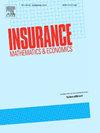Efficient hedging of life insurance portfolio for loss-averse insurers
IF 2.2
2区 经济学
Q2 ECONOMICS
引用次数: 0
Abstract
This paper investigates the hedging of equity-linked life insurance portfolio for loss-averse insurers. We consider a general arbitrage-free financial market and an actuarial market composed of n-independent policyholders. As the combined market is incomplete, perfect hedging of any actuarial-financial payoff is not possible. Instead, we study the efficient hedging of n-size equity-linked life insurance portfolio for insurers who are only concerned with their losses. To this end, we consider stochastic control problems (under the real-world measure) in order to determine the optimal hedging strategies that either maximize the probability of successful hedge (called quantile hedging) or minimize the expectation for a class of shortfall loss functions (called shortfall hedging). Based on the super-replication theory and a duality approach, we show that the optimal strategies depend both on actuarial and financial risks. Moreover, these strategies adapt not only to the size of the insurance portfolio but also to the risk-aversion of the insurer. The numerical results show that, for loss-averse insurers, the strategies outperform the mean-variance hedging strategy, demonstrating the relevance of adopting the right strategy according to the insurers' risk aversion and portfolio size.
规避损失保险公司寿险投资组合的有效套期保值
本文研究了面向亏损规避型保险公司的股票寿险投资组合套期保值问题。我们考虑一个一般的无套利金融市场和一个由n个独立投保人组成的精算市场。由于合并后的市场是不完整的,任何精算财务收益的完美对冲都是不可能的。相反,我们研究了只关心损失的保险公司的n-规模股票挂钩人寿保险投资组合的有效对冲。为此,我们考虑随机控制问题(在现实世界测量下),以确定最优对冲策略,该策略要么最大化成功对冲的概率(称为分位数对冲),要么最小化一类短缺损失函数(称为短缺对冲)的期望。基于超复制理论和对偶方法,我们证明了最优策略同时依赖于精算风险和财务风险。此外,这些策略不仅适应保险组合的规模,而且适应保险公司的风险规避。数值结果表明,对于规避损失的保险公司,该策略优于均值方差对冲策略,这表明根据保险公司的风险厌恶程度和投资组合规模采取正确的策略具有相关性。
本文章由计算机程序翻译,如有差异,请以英文原文为准。
求助全文
约1分钟内获得全文
求助全文
来源期刊

Insurance Mathematics & Economics
管理科学-数学跨学科应用
CiteScore
3.40
自引率
15.80%
发文量
90
审稿时长
17.3 weeks
期刊介绍:
Insurance: Mathematics and Economics publishes leading research spanning all fields of actuarial science research. It appears six times per year and is the largest journal in actuarial science research around the world.
Insurance: Mathematics and Economics is an international academic journal that aims to strengthen the communication between individuals and groups who develop and apply research results in actuarial science. The journal feels a particular obligation to facilitate closer cooperation between those who conduct research in insurance mathematics and quantitative insurance economics, and practicing actuaries who are interested in the implementation of the results. To this purpose, Insurance: Mathematics and Economics publishes high-quality articles of broad international interest, concerned with either the theory of insurance mathematics and quantitative insurance economics or the inventive application of it, including empirical or experimental results. Articles that combine several of these aspects are particularly considered.
 求助内容:
求助内容: 应助结果提醒方式:
应助结果提醒方式:


